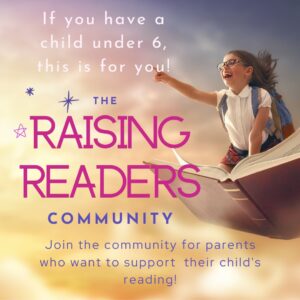How to help your 3 year old with reading!

Reading is so important. It connects us to the world and allows us to become independent. So obviously, we want our children to be able to read. And because you’ve clicked on this blog, I’m going to assume you want to know how to support your 3 year old with reading.
In previous blogs, I’ve mentioned the importance of not teaching your child letters too young. There’s no evidence that it’s beneficial and can even be detrimental!
But I get it, you’re a parent! You want to do the best you possibly can for your child. You want them to have a ‘leg up’ in life. And that feels like it means they need to learn to read as early as possible.
Interestingly, recognising letters early doesn’t support with reading and is often focused on to the exclusion of far more important elements. There are so many other things that we can do as parents to support our kids with reading the twill have a much greater impact.
If you haven’t already read my blog – how to teach your 2 year old to read – you might want to go and check that out before reading this to find out the fundamentals, but otherwise, let’s dive right in!
Helping 3 year olds with reading.
Firstly, carry on with everything you’ve been doing before. All the rhymes, the songs, the conversations, the vocal sounds and the games will be giving your child a fantastic foundation for the next step – blending and segmenting!
Even though these are words that are often included when we talk about reading books, it’s so important that our children are able to blend and segment before they’re ever introduced to letters.
Blending
Blending is the process of putting sounds together to make words. When you’re first trying this with your child, keep the words simple and short, and model pushing the sounds together yourself. For example, when you’re at the breakfast table say ‘please can you pass the c-u-p, cup’. By doing this, you’re showing your child how to listen to the individual sounds and push them together.
Segmenting
Segmenting is the opposite of blending. It’s breaking words down into their smallest sounds. This is much harder for children to learn. Use short words and start by encouraging them to recognise the initial sound in the word, then challenge them to say the other sounds. Saying the word very slowly can help!!
Listening to adults model blending and segmenting is a great way to scaffold learning for our children and will make it easier for them to do later on in their education. Segmenting and blending words here and there during the day will help them to hear each individual sound in words, a much smaller unit of sound than it seems!
Comprehension
Comprehension of stories should still be being developed, focusing mostly on retelling what has happened with pictures as prompts, such as ‘what happened to Humpty Dumpty?’ and answers to direct questions about what they’ve just read. If you’d like to find out more about what questions to ask to help your child, check out my blog – Demystifying Reading Comprehension – here!!
The most important thing you can do to help your 3 year old learn to read is to talk to, and play with, them! Children learn so much from their parents, and vocabulary is one of the biggest and most important. The average 3 year old knows 450 words, but by 4, they know as many as 1000 words. And the difference? Conversation! The more you talk to your child, the more their vocabulary grows, and the easier they’ll find it to recognise words on paper later on.
If you want to support your child further and get more individualised support for both you and your child, check out the Raising Readers Community, where you can learn all about teaching the pillars of reading, how to ensure you’re getting the most out of reading with your child, and how to fit learning into your day with no extra preparation needed from you. Even just a 3 minute activity a day makes a huge difference. Check it out!
